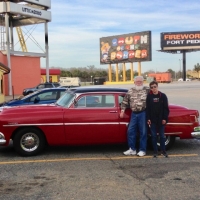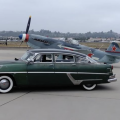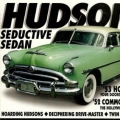Brake issue
Comments
-
More info needed , model of car , power brakes, did you open bleeders for fluid flow.
Etc
0 -
view your email Richie0
-
If it sat for 4 years without moving, and you have DOT3 brake fluid your lines and cylinders are probably jelled. I would pull one of the cylinders and take it apart and see what you got. I had this happen to one of my cars several years ago, lines and cylinders were all goo.0
-
Sounds to me like the pistons are frozen in the brake cylinders.0
-
Thanks 50C8DAN and Geoff I will get back to it tomorrow.
0 -
One long-shot suggestion would be to check your mechanical safety brake. If not adjusted correctly, your brake pedal would engage the mechanical (rear) brakes before it engages the hydraulic system. Thus, no matter how hard you push, only your two rear brakes are stopping the whole car.You can get under the car and watch the action of the safety brake while someone presses down on the pedal, to see if it's cutting in too soon. If it is, then it's a simple matter of adjusting the nut.0
-
Jon B, great suggestion and I already did that. I did that by myself by reaching up and grabbing the brake pedal while on my creeper and watched the travel while working the pedal up and down. I have about an inch of free play before it gets to the mechanical brake. Now that I think of it, the car stops about like if I pulled the emergency brake up. Thanks for your input Jon B. Richie.
0 -
I just purchased a 51 Commodore 6 that sat about 5 years according to the owners widow. It had a hard pedal and no visible leaks. Took 150 to 200 feet to stop from 25 MPH.Pulled the drums. Left side had about 1/4" of lining left, right rear had about 1/8" and the right front was paper thin. The left wheel cylinders were frozen solid (worst corrosion I've seen), right rear was pretty bad (front piston was working some) and the right front was new. I really wounder about the mechanic that replaced the right front cylinder.If it has been parked for several years (or you have little history) just bite the bullet and go completely through the hydraulics. Its easier than fixing it after you wreck it.0
-
Thanks Fred, I'll get back to it as soon as I can.
0 -
put it up on jack stands and spin the wheels by hand one at a time and have someone push the pedal for you. should be able to find out real quick which cylinders are not engaging.0
-
Thanks pistonfarmer, I'll start back working on it this afternoon. Richie
0 -
Fred_Pitz said:I just purchased a 51 Commodore 6 that sat about 5 years according to the owners widow. It had a hard pedal and no visible leaks. Took 150 to 200 feet to stop from 25 MPH.Pulled the drums. Left side had about 1/4" of lining left, right rear had about 1/8" and the right front was paper thin. The left wheel cylinders were frozen solid (worst corrosion I've seen), right rear was pretty bad (front piston was working some) and the right front was new. I really wounder about the mechanic that replaced the right front cylinder.If it has been parked for several years (or you have little history) just bite the bullet and go completely through the hydraulics. Its easier than fixing it after you wreck it.
Fred, just finished in the garage, pulled the wheels and drums and no leaks. Pulled the rubber cup back and still no fluid at all. The linings are like new as they only have about 500 miles on them. Five years ago I did bite the bullet and put all new brake system, rubber lines, master cly, wheel cyls and all new shoes. When I said the car sat for 4 years I should have made myself clear, the car was moved every two weeks from one side of the driveway to the other every time I mowed the lawn.I also did as pistonfarmer suggested, had my wife hit the brake as I spun each wheel the the wheels stopped immediately. Thanks pistonfarmer.
What I just finished doing was putting a .002 feeler gauge between the drum and shoe at the top and bottom of each shoe thru the little slot in the drum. I adjusted the bottom star adjuster until I had the same measurement to the drum between the top of each shoe and the bottom of each shoe.
I did not have to go far with my test drive, about two houses away and the results are the same, just coasts to a stop.
Before I changed the master cyl the brakes worked fine, only reason I changed the M/C was it had a little brake fluid under the rubber cover and I had the trans out and it was easy to get to. The trans was sent to Gus Souza in Chicago and exchanged for a rebuilt 54 dual range hydro.
My last thought is to get another M/C, somehow I believe the new one is defective. I have run out of ideas. Thanks guys for all your help, appreciated. Richie.
0 -
Is the bore the same in both MC?
Free play adjusted so the piston is in right place?
Air in lines?
Is the pedal firm or mushy?
0 -
lostmind, it is the standard Wagner MC3081with a 1" bore. I adjusted the M/C rod to have a little play and that didn't help so I put it back to the original setting. I bled the system twice, no air when I finished. The pedal is very firm, it has about 1 1/2" free travel and then is solid. Thanks. Richie.
0 -
Yes Ken. On my last short test drive last night when I didn't see any improvement I turned around and headed back to the garage. In my PO'D mood I slammed the brakes on as hard as I could, the only thing different was the hood dipped down and then came right back up like I released the brake which I" didn't" do. If I hadn't thrown the old M/C away I would have already put it back on the solve this mystery. Thanks. Richie
0 -
This is a real shot in the dark, but back in December of 1972 I bought a totaled 73 Rivera. It ran a light and was "t-boned" in the left side. Between gas crunches and difficult to find parts it sat for 10+ years. When I finally finished it I went through the hydraulic system "just in case". The rear wheel cylinders were dry inside (just some dried up assembly fluid). I didn't think much of it, but when I finished rebuilding the wheel & master cylinders I could not get fluid to the rear wheel cylinders. The passage to the rear lines had never been drilled during manufacture. GM got lucky that day. At this point I would try taking out the stop light switch and see what happens when you pump the brake. GOOD LUCK!
0 -
Hi Fred, I did have good fluid flow thru the rear wheel cyls. and when the brakes were applied the rear wheels stopped while up on jack stands. I took the new master cyl off this morning and will install another new one I ordered from autozone on Sunday. Thanks for your ideas. Richie.
0 -
i replaced my master cylinder with a new one, which failed within one week - i was very surprised, but the 2nd master cylinder replacement has worked fine since - crappy quality control, i guess
0 -
Thanks to all you folks for all the ideas and help. I changed the M/C out yesterday and finished the job today. "Success" finally, now it stops like a normal car, I think I could actually lock up the wheels if needed. I don't know what was wrong with the other new M/C, but all is well now. Again thanks to everyone. Richie.
0 -
Great to hear brother!0
-
But it was NEW, can't be bad. I prefer to rebuild my own if the bore is good ,Richie said:Thanks to all you folks for all the ideas and help. I changed the M/C out yesterday and finished the job today. "Success" finally, now it stops like a normal car, I think I could actually lock up the wheels if needed. I don't know what was wrong with the other new M/C, but all is well now. Again thanks to everyone. Richie.
NEW parts. Glad you found a good one.
Many times I've replaced a part," While I was in there", and the new one be bad.
0 -
Thanks Glowplug and lostmind, I certainly am relieved. I didn't know what else to do. Now we can just drive and enjoy it. Richie.
0 -
Ken U-Tx said:Residual pressure valve may have been in backwards.......Seen it before. Always bench bleed a MC before hooking up the brake lines, this will alert you to the issue of the pressure valve being incorrectly installed. Also when you bled the brakes at each wheel, didn't the fluid seem to be slow to come out? The fluid should spurt out the bleeder hose , not just dribble / squirt a little.
Hi Ken, I did bench bleed the M/C and it bled normally, nothing seemed out of the ordinary. The fluid flowed normally at the wheels, I watch the bubbles coming out of the hose at the bottom of the jar and when the bubbles stopped the fluid level rose quickly. No restrictions in the flow at all as far as I could tell. Thanks Ken. Richie.0
Categories
- 37K All Categories
- 117 Hudson 1916 - 1929
- 21 Upcoming Events
- 96 Essex Super 6
- 28.6K HUDSON
- 576 "How To" - Skills, mechanical and other wise
- 995 Street Rods
- 151 American Motors
- 181 The Flathead Forum
- 49 Manuals, etc,.
- 78 Hudson 8
- 44 FORUM - Instructions and Tips on using the forum
- 2.8K CLASSIFIEDS
- 609 Vehicles
- 2.2K Parts & Pieces
- 78 Literature & Memorabilia
- Hudson 1916 - 1929 Yahoo Groups Archived Photos




